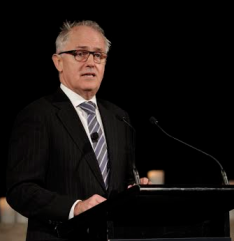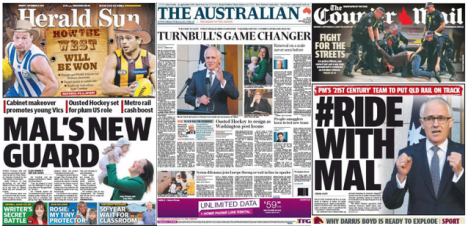Why Turnbull should pursue media reform, despite the opposition of Murdoch and Stokes
 After the appointment of Mitch Fifield as Communications Minister yesterday Nic Christensen argues media reform could and should now be an easy win for the government.
After the appointment of Mitch Fifield as Communications Minister yesterday Nic Christensen argues media reform could and should now be an easy win for the government.
I’m about to do the dangerous thing of contradicting my boss, but I think the issue of media reform could actually be resolved fairly swiftly under Malcolm Turnbull.
After the leadership change last Monday my editor Alex Hayes gave a succinct analysis of why we are unlikely to see media reform before the next federal election: put simply the new PM can’t afford to alienate media moguls Kerry Stokes and Rupert Murdoch, especially in the run up to a 2016 federal election.
Far be it for me to argue with the boss (he is certainly right that the fight will require political will and courage that’s been sorely lacking in Canberra for a while) but that doesn’t mean that they shouldn’t do it. In fact correctly handled it could be an easy win for the Turnbull government and new Communications Minister Fifield.
Media reform has long been stalled with multiple in depth reports (I’m thinking the likes of The Convergence Review and The Finkelstein Inquiry as the most obvious examples) with clear recommendations on how to modernise the existing pre-internet framework, largely falling by the wayside amid fear from the Canberra about upsetting the media moguls.
The biggest challenges facing the new communications minister will be twofold: sorting through a complex multitude of issues on the agenda (while working out what is achievable in the short term) and also dealing with Prime Minister Turnbull who knows his former portfolio backward and who can expected to be quite hands on should the government decide that the political capital it will cost pursuing media reform is worth the potential pain.
So what are the key issues on the media agenda?
One of the challenges when it comes to media reform is the number of powerful stakeholders, who all have separate and largely competing objectives.
The Nine and regional TV networks want the reach rule and two out of three rule abolished, News Corp wants the anti-siphoning list wound back and Kerry Stokes’ Seven West Media stands in opposition to both.
Meanwhile the Department of Communications has launched two reviews into broadcast regulator (and a body largely disliked by the industry) the Australian Communications and Media Authority (ACMA) and appears set to neuter the watchdog somewhat, with some of its powers set to return to the department and the the role of chair and CEO to be split.
The reality is not everyone can be appeased especially on key issues like reach rule, two out of three and anti-siphoning. A point Mitch Fifield – one of Turnbull’s key backers in the coup – will know.
This is how the partyroom voted: http://t.co/RHX19WVqee #libspill pic.twitter.com/Vkt1Rnh0bD
— The Australian (@australian) September 14, 2015
It is largely for this reason that Tony Abbott put the issue in the too hard basket telling the industry that it would not act until there was “wide-ranging consensus”, although Turnbull is reported to have pushed cabinet to act back in March before being stymied by Abbott’s office as he was under too much other pressure.
Turnbull is tipped to be a hands on Prime Minister in the communications space given his in depth knowledge of the area, and it’s this that means some are wondering if the Government will act before the election, despite the substantial obstacles.
What is achievable before the next election?
Much of the current media regime was originally set up in 1992 and while the Howard government tweaked around the edges with foreign and cross-media laws in 2006 there has been little movement to bring the current media laws into the post internet age since.
The ridiculousness of the current regime was put on display last month when Seven announced live streaming of its TV content on its Plus7 app and quickly drew a furious response from the regional TV networks who rightly noted that the product undermined their business models by allowing TV consumers in regional areas to access Seven’s content directly.
That’s not to say Seven should live stream its content on the web, but rather it highlighted how ridiculous rules limiting terrestrial broadcasting to 75 per cent of the population are when Seven is broadcasting to 100 per cent of the population via IPTV.
Credit for pushing the media reform agenda to the top of the policy list has to be given to former News Corp CEO John Hartigan who has coralled the regional TV networks WIN, NBN and Imparja, together with the company he is chairman of Prime, to create a large public media campaign.
https://www.youtube.com/watch?v=drm6vEkS0u8
Now presently Seven and News Corp stand in opposition to those advocating for change.
Nine is keen for a merger or acquisition with one of its sister stations (most likely either Southern Cross Austereo or WIN) but Seven’s position is largely seen as the result of fact that it has neither the money nor appetite to merge with the likes of Prime. News Corp is only interested in reform if all the rules are changed together.
The wild card and potential opportunity to push through media reform here is Ten.
If the competitor regulator ACCC rule in favour the Foxtel investment in Network Ten (they have announced serious concerns but the pressure from the media buyers is for a third more competitive offering) then News Corp’s opposition may well soften.
Ten’s business is struggling financially with its share price bouncing around record lows and even with the new external investment there could still be potential synergies from the merger of say Ten and WIN operation. Billionaire and major shareholder in the TV network Bruce Gordon’s intransigence in the recent Ten sale talks can be largely seen as him wanting to ensure this options remain a live possibility.
Once News has an (indirect) stake in a free-to-air TV network concerns will centre on Ten having good content which could see things like sports shared across Ten and Foxtel.
Its also worth noting that today’s newspapers already have them swinging behind Prime Minister Turnbull despite some hesitancy last week, with headlines like “Mal’s new guard”, “#RidewithMal” and “Turnbull’s Game Changer”.
While the Oz’s Mark Day argues that if Fifield does present reform to cabinet: “I have no doubt the Prime Minister will wave them through.”
With only Stokes and Seven opposed the government would have less to fear from pursuing media reform and there is some suggestions that given the right circumstances (eg. guarantees around anti-siphoning etc.) Stokes too might be appeased with the right guarantees over anti-siphoning and further reductions in licence fees.
Why should Turnbull and Fifield pursue media reform?
The media industry widely agrees that the current set of laws are largely anachronistic. There’s nothing new there.
They were conceived in an era well before we understood the impact of the internet on all media.
Increasingly we are now witnessing the TV Networks go to war over media reform. WIN TV has taken its bat and ball and walked out of the Free TV – today’s AFR reports its chair Harold Mitchell may be in trouble – and at the moment Seven is pulling out all the stops to undermine Hartigan’s campaign.
Plus the last round of end of year financial reports all saw the TV Networks, such as Seven, Nine, and SCA, post poor financial results, most of which included major write downs based on the value of the TV licence.
Should Fifield and Turnbull chart a course through the media reform minefield the industry will likely see another round of consolidation, but in the long term that will likely strengthen many of the TV players.
Plus for the government it will be a feather in the cap of Turnbull as he presses his narrative of kick-starting the economy.
As former deputy PM Tim Fisher (who is backing the regional TV networks) noted to us only a couple of weeks ago: “Watch this space”.
It’s definitely going to be interesting.
- Nic Christensen is deputy editor of Mumbrella






A prediction or maybe just wishful thinking:
– The reach rule could be dropped if legislation required a certain number of hours of local coverage (news largely) by regional stations.
Seven would buy Prime, and if the writer’s quite logical conclusion that Gordon’s WIN could merge with TEN came about, then the outcome would be NINE left to buy/merge with Southern Cross. Rural WIN and SX stations would get a change of network programming but so what (apart from WIN gaining the poorer lineup! But if WIN owns TEN that is some encouragement to do better)
– Cross-media regulations could also be dropped, with the proviso that PAY TV operators cannot own free-to-air, in the interest of maintaining a competitive environment. Common ownership of TV, radio, print and online is not the end of the world.
– The anti-siphoning list could be drastically reduced to test matches, grand finals and a very few races. Pay TV can provide a vastly wider array of coverage of sport and variations of that coverage than can free-to-air. That’s the quid pro quo for charging subscribers and is only fair. Legislation could mandate that any event covered live by Pay TV be available several hours later to free-to-air stations if they want to contract to pick up.
User ID not verified.